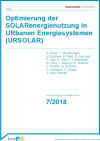Suchergebnisse für "Factsheet: Energietechnologien gestalten, die für alle sinnvoll und nutzbar sind"
Erste Altbausanierung auf Passivhausstandard mit Vakuum-Isolations-Paneelen (VIPs)
Demonstration der Sanierungsmöglichkeit eines Bauwerkes des 19 Jhd. auf Passivhausstandard unter Berücksichtigung von hygrischen Vorgängen sowie in der Demonstration des Einsatzes von Vakuumdämmung.
Wohnhaussanierung auf Passivhausstandard, Makartstraße, Linz

Modernisierung eines mehrgeschossigen Wohnbaues mit 50 WE (errichtet 1957/58). Wird auf Passivhausstandard saniert.
Haus Zeggele in Silz

Energietechnische Sanierung eines historisch erhaltenswerten Wohngebäudes
Optimierung der SOLARenergienutzung in URbanen Energiesystemen (URSOLAR)

URSOLAR stellt EntscheidungsträgerInnen eine Roadmap zur integrierten urbanen Solarenergie-nutzung zur Verfügung. Es wird aufgezeigt, wie Photovoltaik (PV) und Solarthermie angepasst an infrastrukturelle und rechtliche Gegebenheiten in idealtypischen Stadtquartieren aus ökonomischer, ökologischer und sozialer Sicht sowie unter Berücksichtig von Stakeholder-Interessen optimal ge-nutzt werden können.
Schriftenreihe
7/2018
A. Posch, T. Brudermann, M. Buchner, E. Fleiß, D. Geringer, P. Hart, S. Hatzl, T. Kallsperger, G. Lang, T. Mayrold, E. Meißner, C. Reischl, G. Schnedl, S. Seebauer, K. Stöger, A. Würz-Stalder
Herausgeber: BMVIT
Deutsch, 137 Seiten
Downloads zur Publikation
Modernizing by Catalogue

Façade and Open Space Modernization with Standard Building Components in Housing of the Fifties und Sixties.
Sanierung PRO!

Entwicklung eines anwendungsorientierten Verfahrensmodells zur bestmöglichen Integration der Interessen der BewohnerInnen, der Interessen des Bauträgers sowie der Zielsetzungen der Wohnbauförderung
Passivhaus Auleiten (Neuhofen, Oberösterreich)
Flachgedecktes Passivhaus in engparzellierter Siedlungsstruktur
Effective Comfort in a Climatic comfort house
Sophisticated implementation of different passive house-building services systems on a basis of four similar parts of a structure of multi-storey dwelling houses.
SolCalc: Development of a standardized calculation algorithm for the energy consumption assessment and the energy certification of residential buildings with a solar fraction of up to 100% in combination with biomass boilers and heat pumps
Development of a standardized calculation algorithm for the energy consumption assessment and the energy certification of residential buildings with a solar fraction of up to 100% in combination with biomass boilers and heat pumps
Urban consolidation Lehen - Subproject 8a: project management - documentation - dissemination and quality assurance
The project coordinates several projects in the urban quarter Lehen to ensure increase of energy efficiency and sustainable development. This subproject contains the coordination of the partners and projects in order to reach defined standards of quality, coordination and cooperation with the program "Building of Tomorrow" and other flagship projects as well as the documentation of results.
New Conceptions for elderly people in new construction and renewal

Development of a catalogue of criteria for senior-housing and detailed implementation plans of a new building and/or of a reorganization project in Vienna, located in the 16th district; Costs and comparison analysis between "ordinary" New building and/or "ordinary" Reorganization and senior-housing new buildings and/or renewal
EXPO HdZ: Best of Diffusion

Conception and implementation of measures to spread selected results from the house of the future - program to the building industry, in particular to meet the target groups architects, builders and building developers.
openVALUE - Quality and Weight of Open Spaces of Urban Building Projects
Based on four case studies the comprehensive contribution of open space to the increase of quality in real estate development was presented and provides the basis for the development of application oriented measures of quality management and strategies for innovative solutions.
e80^3-Buildings - Sub project 2: Concept development
Based on the selection of suitable demonstration projects in Subproject 1 an innovative concept for passive and active building envelopes and energy supply of so called "Plus Energy Buildings" (renovation) has been developed.
Ecological restoration of a listed building with passive house technologies
Ecological exemplary reconstruction of the "Haidenhof"-building, Bad Ischl, Upper Austria. Building refurbishment with respect to monumental protection and newest passive house technologies. Reorganisation of the former residential building to an academy of arts and culture.
Modular and standardised passive houses in solid timber construction
Concerning to an accurate and adaptable construction of 2 to 4 storey solid timber houses with the characteristics of a passive house, a digital construction and dimension system will be developed. The system which contains standardised modular ecological detailed solutions enables an exact dimensioning and installation of passive houses by small carpentering companies.
Innovative Refurbishment of Single Family Houses

Evaluation of best-practice models and recommendations to support dissemination
Technical status of ventilation systems for buildings

Evaluation of existing ventilation systems in Austria considering technical quality and practicability.
Cooperative Refurbishment

Models for participation of owners and tenants in ecological refurbishment of multi floor buildings
Benchmarking - sustainability of housing subsidies across the federal provinces

Systematical description, analysis and comparison of all ecological, economic and social sus-tainability of the systems aspects of housing subsidy for new buildings and the renovation of buildings across the federal provinces of Austria; an analysis of regional-economic effects and a statistical-econometric analysis of the allocation effects of housing subsidies.
